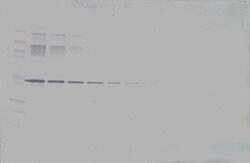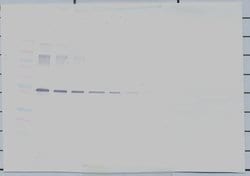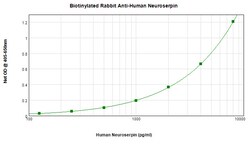Learn More
PeproTech Neuroserpin Polyclonal Antibody, Biotin, PeproTech®, Invitrogen™

Description
AA Sequence of recombinant protein: MTGATFPEEA IADLSVNMYN RLRATGEDEN ILFSPLSIAL AMGMMELGAQ GSTQKEIRHS MGYDSLKNGE EFSFLKEFSN MVTAKESQYV MKIANSLFVQ NGFHVNEEFL QMMKKYFNAA VNHVDFSQNV AVANYINKWV ENNTNNLVKD LVSPRDFDAA TYLALINAVY FKGNWKSQFR PENTRTFSFT KDDESEVQIP MMYQQGEFYY GEFSDGSNEA GGIYQVLEIP YEGDEISMML VLSRQEVPLA TLEPLVKAQL VEEWANSVKK QKVEVYLPRF TVEQEIDLKD VLKALGITEI FIKDANLTGL SDNKEIFLSK AIHKSFLEVN EEGSEAAAVS GMIAISRMAV LYPQVIVDHP FFFLIRNRRT GTILFMGRVM HPETMNTSGH DFEEL. Preparation: Produced from sera of rabbits immunized with highly pure Recombinant Human Neuroserpin. Anti-Human Neuroserpin-specific antibody was purified by affinity chromatography and then biotinylated. Sandwich ELISA: To detect Human Neuroserpin by sandwich ELISA (using 100 mL/well) a concentration of 0.25-1.0 μg/mL of this antibody is required. This biotinylated polyclonal antibody, in conjunction with PeproTech Polyclonal Anti- Human Neuroserpin (500-P271) as a capture antibody, allows the detection of at least 0.2-0.4 ng/well of Recombinant Human Neuroserpin. Western Blot: To detect Human Neuroserpin by Western Blot analysis this antibody can be used at a concentration of 0.1-0.2 mg/mL. When used in conjunction with compatible development reagents the detection limit for Recombinant Human Neuroserpin is 1.5-3.0 ng/lane, under either reducing or non-reducing conditions. 500-P271BT-1MG will be provided as 2 x 500 μg

Specifications
Specifications
| Antigen | Neuroserpin |
| Applications | ELISA, Western Blot |
| Classification | Polyclonal |
| Concentration | 0.1-1.0 mg/mL |
| Conjugate | Biotin |
| Formulation | PBS with no preservative |
| Gene | Serpini1 |
| Gene Accession No. | Q99574 |
| Gene Alias | AI837402; DKFZp781N13156; neuroserpin; Ns; Peptidase inhibitor 12; PI12; PI-12; protease inhibitor 17; raPIT5a; serine (or cysteine) peptidase inhibitor, clade I, member 1; serine (or cysteine) proteinase inhibitor clade member 1; serine (or cysteine) proteinase inhibitor, clade I (neuroserpin), member 1; serine protease inhibitor 17; serpin family I member 1; serpin I1; serpin peptidase inhibitor clade I member 1; serpin peptidase inhibitor, clade I (neuroserpin), member 1; serpin peptidase inhibitor, clade I, member 1; SERPINI1; Spi17 |
| Gene Symbols | Serpini1 |
| Show More |
By clicking Submit, you acknowledge that you may be contacted by Fisher Scientific in regards to the feedback you have provided in this form. We will not share your information for any other purposes. All contact information provided shall also be maintained in accordance with our Privacy Policy.




